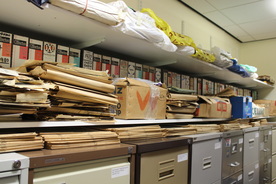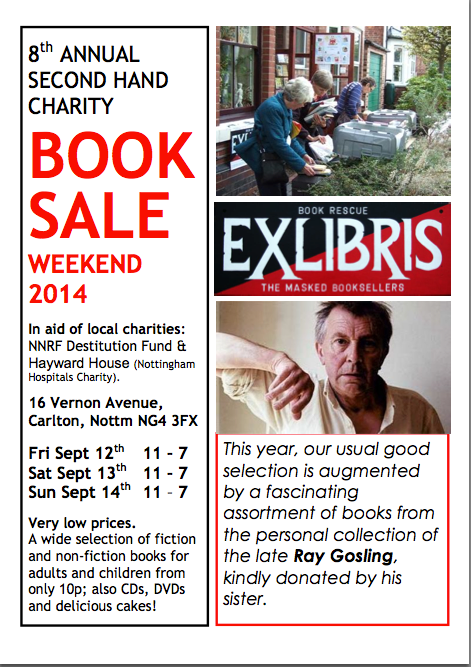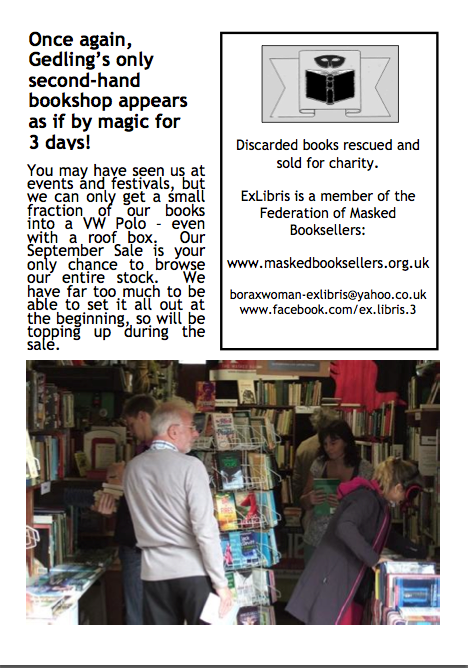
It was only about six months ago I stood in Nottingham Trent’s Arts and Humanities department, in a room of Ray’s archives. My brother had told me, back in 2005, of the rescue by the university of his papers from his big house. Then last year, after his death I had helped to box more papers from his flat. The more papers were about 30 large boxes, lots of box files and more, all jostling for space in an already crammed room. How to make order of this . . . the content of the boxes - just amazing . . . but . . . you would find a draft script next to jottings made on a train trip to a sea-side town, with an allotment catalogue and a letter from an irate radio listener who was so angry that Ray had not visited the back room tea shop on one of his travels, just a witty, interesting and wonderful mix, set amongst magazines, newspaper cuttings, plastic bags and beer mats.
How to make this collection into an organised archive . . . well six months down the line with help from Professor John Goodridge and hours of toil from Colin Haynes there is progress. We now have nearly 200 box files, numbered and listed by alphabetical subject. The number of large boxes is dwindling as the contents get put into their subject box file. Recordings are also being listed and local interest, in particular St Ann’s history, collected together. It is very rewarding seeing the start of a system and perhaps a glimmer of these being made available for others to enjoy and use. It is also a snapshot of a forty-year period of social change, the early days of popular television. Seeing the handwritten notes crafted into a television or radio programme - a treat.
What now? Well there are more boxes to come, Ray had a work room in Manchester which is being sorted to join the rest in Nottingham Trent and I hope that next year we can start to see how to get this archive to a point where it can be used and enjoyed. I plan to update over the months and please contact with any ideas, comments etc.
Juliet Grant
Oh! - found in one of the boxes - Ray’s comment on the archive
" Left to my own will my concern is for my papers – 90% of which should be taken to the tip and enter the district heating scheme. True, but the 10% aye to find the 10%. The paper mountains are a heck of a mess – but within them is quite a lot of valuable stuff – archive value, intrinsic value and as a whole a museum of its own worth. It might need more shelving. Thanks Ray. "
How to make this collection into an organised archive . . . well six months down the line with help from Professor John Goodridge and hours of toil from Colin Haynes there is progress. We now have nearly 200 box files, numbered and listed by alphabetical subject. The number of large boxes is dwindling as the contents get put into their subject box file. Recordings are also being listed and local interest, in particular St Ann’s history, collected together. It is very rewarding seeing the start of a system and perhaps a glimmer of these being made available for others to enjoy and use. It is also a snapshot of a forty-year period of social change, the early days of popular television. Seeing the handwritten notes crafted into a television or radio programme - a treat.
What now? Well there are more boxes to come, Ray had a work room in Manchester which is being sorted to join the rest in Nottingham Trent and I hope that next year we can start to see how to get this archive to a point where it can be used and enjoyed. I plan to update over the months and please contact with any ideas, comments etc.
Juliet Grant
Oh! - found in one of the boxes - Ray’s comment on the archive
" Left to my own will my concern is for my papers – 90% of which should be taken to the tip and enter the district heating scheme. True, but the 10% aye to find the 10%. The paper mountains are a heck of a mess – but within them is quite a lot of valuable stuff – archive value, intrinsic value and as a whole a museum of its own worth. It might need more shelving. Thanks Ray. "


 RSS Feed
RSS Feed